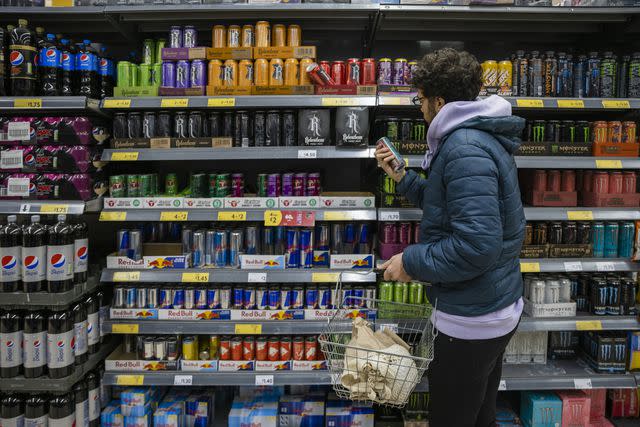Study: Even the Occasional Energy Drink Can Increase the Risk of Sleep Disturbances
Fact checked by Nick Blackmer
New research suggests that drinking energy drinks, even just occasionally, may interfere with sleep.
Frequent energy drink consumers reported fewer sleeping hours and more sleep disturbances.
Experts say caffeinated energy drinks can affect the time it takes a person to fall asleep and how long a person can stay asleep.
Energy drinks are advertised as a way to boost mental and physical performance, but a new study suggests that drinking them—even on occasion—may interfere with sleep.
The research, published in the journal BMJ Open, found an association between energy drink consumption and insomnia and poor sleep quality among younger adults.
Researchers found that the more often people consumed energy drinks, the fewer hours they slept overall and the more tired they felt. Furthermore, frequent energy drink consumers reported more sleep disturbances, such as waking up throughout the night, than those who didn’t drink as much.
Even occasional energy drink consumption—only one to three times a month—was linked with more sleep issues, the study found.
While previous studies have shown an association between energy drinks and poor sleep quality, the researchers wrote that “the current study extends the findings...by providing more in-depth information” on which aspects of sleep are affected by consumption.

SolStock / Getty Images
Finding the Link Between Sleeplessness and Energy Drinks
The study used data from 53,226 people aged 18 to 35 involved with the Students’ Health and Well-being Study, a survey of lifestyle habits among higher education students in Norway. Participants answered questions about their energy drink consumption and sleep habits, including when they fell asleep, how long it took them to fall asleep, and when they woke up.
Researchers found that a higher percentage of men reported daily energy drink consumption than women (5% vs 3%, respectively), but the drinks had a similar effect on both groups: Daily drinkers took longer to fall asleep and were more likely to wake up during the night than occasional or non-drinkers. In total, daily drinkers slept an average of about 30 minutes less a night.
While daily drinkers experienced the most sleep interference, periodic energy drink consumption was also associated with poorer sleep.
Participants who said they drank energy drinks two to three times a week were more likely than non or occasional drinkers to go to bed later, sleep less than six hours, and wake up throughout the night. People who reported drinking energy drinks one to three times a month had an “increased risk of poor sleep,” the researchers wrote.
The researchers emphasized that the study shows an association between energy drink consumption and sleep issues but that it doesn’t prove that the drinks cause sleeplessness.
Related: 7 Symptoms of Caffeine Withdrawal—And How to Manage Them
How Energy Drink Consumption Can Affect Sleep
Experts said energy drink consumption could interfere with sleep because the beverages have a high caffeine content.
According to Ilisa Nussbaum, RD, a registered dietitian nutritionist at Yale Children’s Hospital, nutrition labels show a single can contains an average of 200 to 300 milligrams (mg) of caffeine. That’s more than double the amount in an eight-ounce cup of coffee and at least six times the amount in a 12-ounce Coke.
She adds that some energy drinks may have even more caffeine than their labels suggest because the drinks include guarana or other caffeine-containing ingredients that aren’t included in the overall calculation.
Caffeine—regardless of whether it comes from an energy drink or another source—can lead to feelings of alertness by stimulating the nervous system and circulation of some hormones.
While that can make it enticing for people looking for an energy boost, consuming caffeine can come at the cost of a restful night’s sleep, Steven Feinsilver, MD, director of the Center for Sleep Medicine at Northwell Lenox Hill Hospital, told Health. Caffeinated energy drinks “affect both sleep initiation and sleep maintenance,” he said.
Nussbaum warns that caffeine-induced sleep problems could jumpstart a dangerous cycle in which people feel tired and therefore tempted to reach for another energy drink, leading to “reliance on energy drinks every day.”
Related: 16 Natural Energy Boosters
What to Consider Before Consuming an Energy Drink
If you want to consume an energy drink without it disrupting your sleep, Nussbaum said to keep in mind that the drink’s effects should last for about four to six hours. That means pounding one after dinner could increase your risk of having sleep troubles, but sipping on one early in the morning probably won’t have an effect.
You may also want to consider factors beyond sleep concerns when assessing how energy drinks might impact health, Nussbaum said.
While non-pregnant or breastfeeding healthy adults can safely consume 400 mg of caffeine a day (more than the amount that most energy drinks contain), she said it’s important to recognize that “side effects such as heart palpitations, elevated blood pressure, and agitation can vary wildly depending on weight, sex, age, and metabolism.”
She suggests paying attention to how your body reacts to caffeine and recognizing “what your personal limitations are.”
And keep in mind, Nussbaum added, that it’s never a good idea to consume energy drinks while drinking alcohol. “The stimulant effects of caffeine can mask the effects of alcohol, leading to overconsumption,” she said.
For more Health.com news, make sure to sign up for our newsletter!
Read the original article on Health.com.

